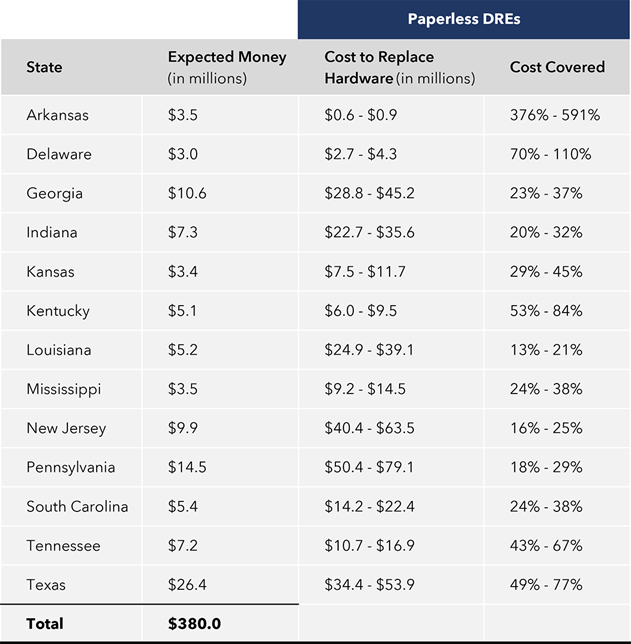Updated - Voting 2018: New Election Security Funds are Breakthrough for Democracy

Updated: Trump-Approved Budget Short on Election Security, Counties Say
Tucked away in the massive $1.3 trillion spending bill President Donald Trump signed last week is a nugget of funding that local election officials have desperately needed. Unfortunately, they say, it isn’t nearly enough.
It’s only “a drop in the bucket of what is really needed,” said Jeff Greenburg, the director of elections in Mercer County, Pennsylvania.
Pennsylvania is one of 41 states where some counties and cities use election equipment that is more than a decade old, according to the New York University School of Law’s Brennan Center for Justice. Older machines are more likely to malfunction or break down on Election Day, causing long lines and potentially dissuading some people from casting their ballots. Some older machines also are susceptible to wireless malware attacks, even if they are not directly connected to the internet, or have removable memory devices a hacker might manipulate.
The Brennan Center for Justice at NYU Law welcomed news that Congress has set aside $380 million to shore up the nation's aging election infrastructure. The Brennan Center has long advocated for replacing outmoded machines and computers vulnerable to hacking or malfunction as a way of securing our democracy.
"With so much infighting on Capitol Hill, this is a breakthrough for election security and the health of our country's democracy," said Lawrence Norden, deputy director of the Brennan Center's democracy program. "Dozens of states are struggling to keep old equipment up to date, and this infusion of cash from Congress is an important down payment on securing our elections, and instilling confidence among the public that their votes will be accurately, securely counted."
The Brennan Center estimates that this fall some 41 states will use balloting machines more than a decade old. The Center has reported that state election officials have resorted to buying spare parts on eBay, and some rely on computers running outdated software like Windows 2000 to manage elections and voter registration.
The Brennan Center has previously advocated for roughly $400 million to replace the nation's most insecure voting machines, and has worked with lawmakers and voting technology experts to press for these funds to be appropriated by Congress. But in a new analysis conducted by the Brennan Center and Verified Voting, the groups found that because of the way the omnibus funds will be allocated, they will still be insufficient to replace all the country’s most insecure paperless systems that are impossible to audit to ensure accuracy.
"Thirteen states use these types of non-auditable systems – five statewide – and while some states will receive sufficient funds to replace them, most will only get only a fraction of the necessary funds," said the Brennan Center's Norden. "So while there is much to celebrate today, tomorrow the campaign to secure our elections continues."
The Brennan/Verified Voting analysis looks at the replacement cost for what are known as paperless DREs (or direct-recording electronic voting machines). These machines produce no auditable paper ballot, so they are nearly impossible to audit if a system breaks down or malfunctions. The Brennan/Verified Voting analysis then takes the funding allocation formula in the omnibus to estimate how much these new funds will allow states to replace these vulnerable machines.
Of the 13 states that use paperless DREs, the new funds will not allow full replacement in at least 11 of those states.

Note: The Brennan Center's estimates are lower than some state-specific estimates. Replacement costs here are based on equipment, not on maintenance or software licensing. For more information, read the full analysis here. Read about all the Center's work on election security and infrastructure here.
More Articles
- Brennan Center: One in Three Election Officials Report Feeling Unsafe Because of Their Job
- Assessing Russian Activities and Intentions in Recent US Elections: With illicit access, manipulation of voter data or disruptions to their availability may impact a voter’s ability to vote on Election Day
- Voter Registration Deadlines for the General Election by State; Which State Doesn't Require Registration?
- Updated: Looking Ahead to 2014 Elections, Voting Laws Roundup 2013
- From Selma to Shelby County: Working Together to Restore the Protections of the Voting Rights Act
- Looking Ahead to 2014 Elections: Voting Laws Roundup 2013
- Brennan Center: Ballot Security and Voter Suppression






